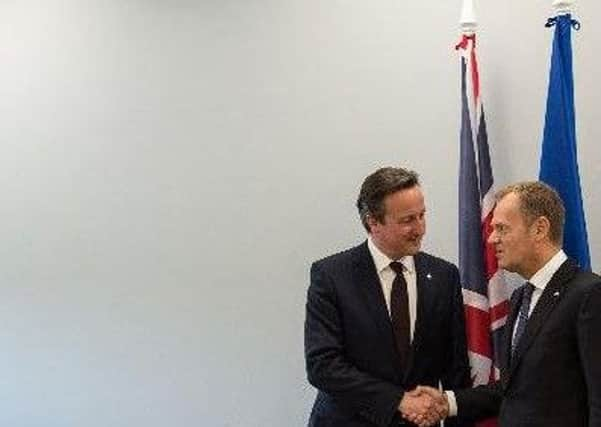EU deal: Everything you need to know in 5 minutes


Why are we having a referendum?
David Cameron promised the British public an in-out referendum on membership of the EU in the Conservative Party manifesto, largely in response to backbench and grassroots feeling...but also to counter the same offer from UKIP. It will be the first time voters will go the polls on this issue in 40 years.
When will the referndum be?
Politicians, journalists, Labour, Brexit campaigners will all lose a few friendly bets if the date isn’t on Thursday June 23. It is the only date far enough away from the Scottish, London mayoral and local elections, but before the Scottish summer holidays so the maximum number of people can vote.
Does David Cameron want to leave the EU?
No.
Advertisement
Hide AdAdvertisement
Hide AdSo David Cameron promised to hold a referendum on whether to leave the EU, but doesn’t actually want Britain to leave?
Yes. Bonkers? Definitely. But back in 2015, it was all about doing something to look tough on Europe to stop the meteoric rise of Nigel Farage.
So what’s the ‘deal’?
The Prime Minister didn’t just want to ask the British people to stay or leave the EU, he wanted to present them with an alternative. Essentially a reformed relationship with the union, which makes Britain a ‘special case’ (interpret that as you will). Already we are not part of the Euro currency or the Schengen Area agreement on open borders, but Mr Cameron wanted to go further.
He suggested four changes on cutting red tape, stopping Britain being part of a closer political union, protection for the pound and curbs to welfare. This would make our relationship with the EU entirely different to the terms of membership for say, France, Germany, Spain, Poland....etc.
Advertisement
Hide AdAdvertisement
Hide AdHe then had to go to the European Council in Brussels on Thursday and Friday to ask all 27 members of the European Union to back his proposals.
Let’s hear more about what he was asking for?
He wanted four changes, which he curiously liked to call his ‘four baskets’. The only one that really annoyed his European counterparts was his plan to apply an emergency four year brake to in-work benefits to EU migrants and pay child benefit to migrants at the local rate of their home country. Poland, Czech Republic and Hungary were particularly unhappy about this one.
What did he get?
- The UK can decide to limit in-work benefits for EU migrants during their first four years in the UK, and it must be released after seven years. Mr Cameron thinks this is a big win, as it appears to increase the time-scale of his original four year promise.
- Protection for the City of London to prevent eurozone regulations being imposed on it.
Advertisement
Hide AdAdvertisement
Hide Ad- The most formal of all EU agreements is a Treaty change, which he has managed to secure over not being part of an ‘ever closer union’.
Is this the deal proposed any good?
If you’re a Eurosceptic, then only by leaving the EU altogether will Britain regain sovereignty and control over its own affairs. They say Cameron’s reforms plan is weak and people shouldn’t be swayed by it to remain in the EU. They also doubt it will have any impact on migration figures and believe the European Court of Justice can unpick the whole thing anyway.
If you’re a fan of Europe, then you might think the deal is a good one and satisfies a need for mild change. Then there’s about a third of the population who currently have no opinion and are the people who could sway the whole referendum.
What happens now?
The Prime Minister is asking his cabinet to back the plan this morning - the first time a cabinet has met on a Saturday since the Falklands War. If the majority agree (which they will) then he will use it as the basis for the referendum. British people will be asked to stay or leave the EU, but with the promise that if they stay then the relationship puts Britain back in the driving seat over its own affairs.
Who are the key players?
Advertisement
Hide AdAdvertisement
Hide AdCameron is naturally the protagonist in this on-going EU drama, taking on Brussels and negotiating a deal in Britain’s favour is as much about reform as it is about his own personal legacy.
German Angela Merkel backs Britain’s reform plan, and the fact Germany is the biggest net contributor means she’s been a powerful figure of influence.
And erm, Boris Johnson...Cameron is obsessed about getting the blonde mopped politician to back his reforms plan publicly. But the charismatic tour de force is keeping him guessing, and maintains his position as a perpetual thorn in Cameron’s side since the pair’s Bullingdon days.
AND YOU!
Let’s not forget the voters of Yorkshire get to exercise their wonderful democratic right on how they feel about the EU when they go to the polls. None of this is about what the politicians think - it’s about what the British public want.
What will we be asked?
The current proposed wording is: “Do you think that the United Kingdom should remain a member of the European Union. Yes or no”